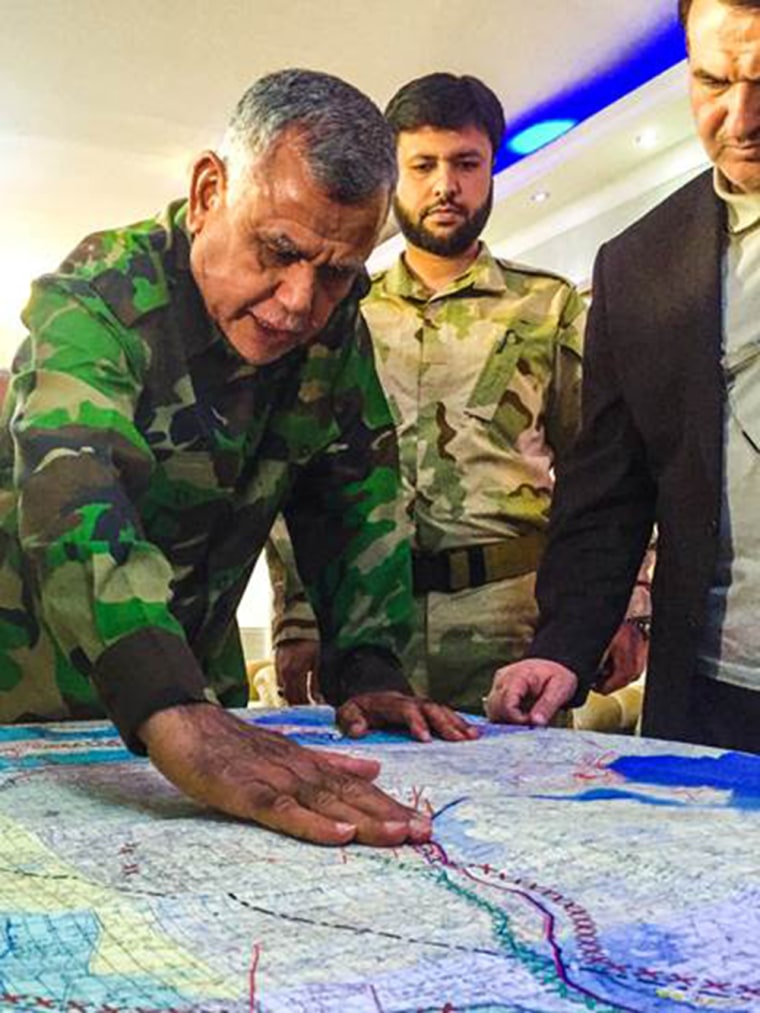NEAR RAMADI, Iraq — U.S. airstrikes targeting ISIS around Ramadi are proving "not very effective," according to the head of the Iran-backed militias surrounding the conquered Iraqi city.
"We expect more from the Americans," Hadi al-Ameri told NBC News. "There are no real airstrikes against ISIS headquarters."
According to the Pentagon, there have been more than 50 airstrikes near Ramadi by the U.S.-led coalition in the last five weeks. The city fell to the Sunni militants in mid-May after Iraqi army units retreated.
Al-Ameri, who is now one of the most powerful men in Iraq, commands the Popular Mobilization Units, an umbrella group of Shiite militias which have Ramadi in their sights. He predicted the operation to retake the city from ISIS would take weeks.
His militias are financed, armed and inspired by Iran. He claims Qassim Suleymani, head of Iran's elite special operations unit, the powerful Quds Force, is a close friend. Suleymani visited al-Ameri's troops on the front line at Tikrit before they retook the city from ISIS in the spring.
Since the initial waves of coalition airstrikes against large groups of ISIS fighters in the open, most ISIS units have retreated into urban areas where civilians provide cover against airstrikes, U.S. officials said.
While not responding directly to al-Ameri, they pointed out what they called a dramatic difference between U.S. tactical airstrikes and Shiite militia tactics that consider the killing of innocent civilians acceptable.
U.S. officials said it’s difficult to launch airstrikes against ISIS fighters deeply embedded in civilian urban areas without inflicting civilian casualties. A senior defense official warned that “lowering our standards against collateral damage,” or civilian deaths, would “do serious damage to our overall strategy and effort.”
Al-Ameri conceded that some of the units in his Badr Organization have killed Sunni civilians. He added: "It's part of war ... as America knows when it invaded Iraq and killed many civilians."
Criticism of the Americans is not limited to the Shiite militias, said Fawaz Gerges, a professor of Middle Eastern politics and international relations at the London School of Economics.
"It is a deeply widespread belief among Iraqis of all persuasions that the Americans did not do enough," he told NBC News. "It is a belief held across the board of the Iraqi political class. ISIS has been able to manipulate and exploit the contradictions and tensions that exist between the coalition partners."
The United States claims to have killed 10,000 ISIS militants, but ISIS militants "don't give a damn about numbers," Gerges said.
"ISIS has already won strategically because they have won the narrative. What’s the narrative? We are winning," he said. "This provides nourishment and sustenance to recruits worldwide."
Washington is worried that using Shiite militias, many of which have a record of brutal human-rights abuses, to retake cities like Ramadi risks alienating Iraq's Sunni population. The Sunni population of Anbar province is now caught between harsh ISIS rule and possible liberation by militias they loathe.
Al-Ameri insists is under the command of the Baghdad government though he once fought against Iraq for Iran's revolutionary forces in the 1980s. "I take my orders from Baghdad, not Tehran," he said. "Every operation is authorized by the prime minister."
He added: "America is not and never has been my enemy."

More than 20 percent of Iraqis are Sunni. Enmity has existed between Shiites and Sunnis for around 1,400 years, and stems from the conflicting beliefs on who should lead the faithful. According to Shiites, leadership ought to be handed down through Muhammad's descendants, such as Hussein, while Sunnis believe power should have passed first to the Prophet's companions and then a series of "caliphs" chosen by the faithful.
Al-Ameri claimed his men had already cleared ISIS from a large area near Ramadi but they won't begin an assault on the city until the supply lines to the nearby city of Fallujah, also under ISIS control, have been cut. He told NBC News that "it will be easy to liberate Ramadi ... in weeks, not months," once his forces have finished the "battle of Fallujah."
While American airstrikes "could be very important" and U.S. trainers would help the Iraqi army, al-Ameri insisted militias could take Ramadi alone. "We stopped ISIS when they were 12 to 15 miles from Baghdad," he claimed.
As to that claim, U.S. officials pointed out that heavily armed U.S. Army Apache attack helicopters played a major role in that operation against ISIS fighters who were “in the open and fully exposed.”
At the same time, senior military officials told NBC News, U.S. military advisers share the Al-Assad military base with Shiite militia, “but we don’t come into contact for any reason.” The officials also acknowledged that U.S. warplanes and armed drones will launch airstrikes to protect Shiite militia operating under the control of Iraqi military commanders.
Earlier, al-Ameri hosted the U.S. Ambassador to Iraq Stuart Jones at his house in the capital's heavily protected Green Zone.
The reason for the Jones' visit with al-Ameri on Friday was unclear but America's relationship with the Shiite militias is complex. They share a common enemy in ISIS. But the U.S. refused to conduct airstrikes around Tikrit in support of the militia attack, insisting it would work only with the Iraqi army.
Abu Mahdi al-Muhandis, the senior commander of the militias, is on the U.S. government’s list of designated terrorists for his involvement in the Iraqi insurgency. But like the U.S., he now is fighting against ISIS.
